Ecuador Sticks With Trump-Friendly President
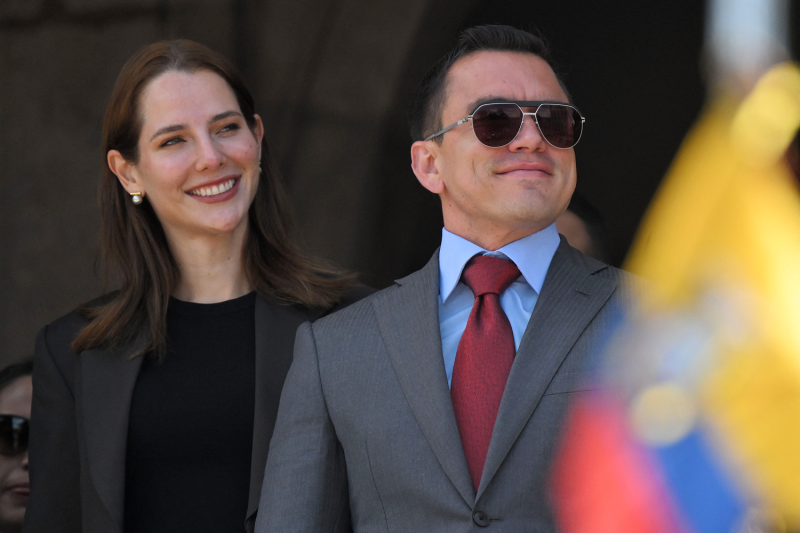
Ecuador Sticks With Trump-Friendly President
Incumbent Daniel Noboa won a campaign roiled by transnational gang violence and an energy crisis.
Ecuador’s reelected president, Daniel Noboa, right, and his wife, Lavinia Valbonesi, gesture from a balcony of the Carondelet Presidential Palace during the changing of the guard ceremony in Quito on April 15. Rodrigo Buendia/AFP via Getty Images
QUITO, Ecuador — Latin America’s first presidential election of 2025 is in the books. Ecuador’s president, Daniel Noboa, comfortably won reelection over his rival, Luisa González, after a campaign dominated by a security crisis as the country’s violent crime rate has skyrocketed due to drug-related violence.
The right-wing Noboa has crafted a tough-on-crime image, promising to crack down on the transnational drug cartels that have caused crime spikes in Ecuador in recent years. He won despite temporarily losing popularity in late 2024 when a severe drought led to energy rationing and rolling blackouts across the country.
QUITO, Ecuador — Latin America’s first presidential election of 2025 is in the books. Ecuador’s president, Daniel Noboa, comfortably won reelection over his rival, Luisa González, after a campaign dominated by a security crisis as the country’s violent crime rate has skyrocketed due to drug-related violence.
The right-wing Noboa has crafted a tough-on-crime image, promising to crack down on the transnational drug cartels that have caused crime spikes in Ecuador in recent years. He won despite temporarily losing popularity in late 2024 when a severe drought led to energy rationing and rolling blackouts across the country.
González, a leftist protege of former President Rafael Correa, rejected the initial results and demanded a recount after the National Electoral Council declared Noboa the winner.
Noboa and González had faced off in a closer-than-expected first-round election in February, in which both candidates secured around 44 percent of the vote but fell short of the 50 percent needed to avoid an April runoff. But Noboa appears to have made up ground in the interim, winning Sunday’s vote by a sizable margin.
“This day has been historic, this victory has also been historic, a victory by more than 10 points,” Noboa told supporters after the results were announced. “There is no doubt who the winner is.”
In the capital of Quito, supporters held up life-sized cardboard cutouts of a sunglasses-clad Noboa, one dressed in a Spider-Man costume. Noboa first won snap elections in 2023 by vowing to stiffen drug penalties and increase surveillance of alleged drug dealers. Ecuador had seen an unprecedented rise in homicides as Colombian and Mexican drug cartels infiltrated local gangs and used the country for the transshipment of cocaine, turning the once-peaceful nation into the most dangerous in South America.
But Noboa’s first 16 months in office brought little improvement. While the homicide rate dropped between 2023 and 2024, it has spiked again in 2025, with a record 781 killings in January alone in a country of just 18 million people. He faced heavy criticism last year when four children, aged 11 to 15, were captured by an air force patrol after playing a soccer game, then found dead weeks later. Neither Noboa nor his opponents openly pointed fingers at the military, which has been accused of widespread rights abuses during anti-crime campaigns.
His response has been to draw closer to the United States and President Donald Trump, who congratulated Noboa on his Truth Social network on Monday morning.
“His entire discourse focuses on international collaboration, primarily from the United States,” said Esteban Ron, dean of the Faculty of Social and Legal Sciences at Quito’s SEK International University.
Noboa attended Trump’s January inauguration and last month visited Mar-a-Lago after reportedly paying a consulting firm to secure him an invitation.
Ecuador is planning for the construction of a naval facility in the coastal city of Manta that will host U.S. forces, whom Noboa hopes will assist in battling gangs. The U.S. military manned a base in Manta until 2009, when then-President Correa declined to renew its lease. González opposed the establishment of foreign military bases in Ecuador, which are currently prohibited under its constitution.
Noboa in March announced a “strategic alliance” with Blackwater founder Erik Prince, who has lobbied in recent months to involve himself with anti-drug operations in Latin America and deportations from the U.S. to El Salvador. Days before the election, Prince joined law enforcement operations in Guayaquil, Ecuador’s largest city and one of its most dangerous. The group detained 40 people, many of whom have since been released.
“[They were] seemingly used to promote a publicity campaign” for Prince, said Carla Morena Álvarez Velasco, a professor and researcher at the Ecuadorian Institute of High National Studies. “His participation appears uncoordinated with any known local strategy or objective, and coincides with a political timing that is difficult to overlook.”
Ecuador’s surge of violence spilled into politics in 2023 when presidential candidate Fernando Villavicencio, a critic of corruption and criminal gangs, was assassinated at a rally in the north of Quito, allegedly at the order of the Los Lobos organized crime group. Just before the election, Villavicencio’s widow accused the Noboa administration of pressuring her to blame Correa’s political party for the murder despite already knowing who was responsible.
But Noboa was able to soundly defeat an opposition campaign that sometimes appeared disorganized and lacked substantive alternatives to Ecuador’s security, economic, and energy issues.
González pledged to follow her mentor, Correa, by increasing social spending to help those living in poverty. But her party’s past economic mishaps “undermined her discourse” among the public, Ron said.
Noboa touted his relationship with Trump in angling to avoid tariffs, claiming that its 10 percent rate would rise should González win. He has not commented on Trump’s cuts to the U.S. Agency for International Development, which delivered $117.3 million between 2020 and 2024 to Ecuador.
Ecuadorians have left the country in droves; more than 90,000 people left in 2024, and Ecuadorians were the second-largest group crossing the Darién Gap in 2023, after Venezuelans.
In the final months of 2024, the crisis worsened when Ecuador, which relies on hydropower for about three-quarters of its energy, experienced a severe drought that led to a power shortage and scheduled blackouts of up to 14 hours per day. Noboa’s administration was criticized for ignoring warning signs earlier in the year, when water levels were low in the Amazon.
“It ended up affecting the image of Noboa in the first round,” said Homero Paltán, a researcher on climate and water risks at Oxford University. “[He] got lucky, in a way, that it started raining.”
With the blackouts in the rearview mirror, Noboa and González mostly played a blame game during the campaign. Noboa accused Correa of causing it by relying too heavily on hydropower, while González said there were no blackouts under Correa, although his presidency occurred during a series of unusually wet years.
“The discussion has been highly political from both sides without really addressing the technical and structural issues,” Paltán said.
Both candidates expressed openness to increasing Ecuador’s capacity of wind, solar, and other renewable energy, and promised to repair thermal power plants that malfunctioned during the crisis. Noboa has pledged to seek private investment in the energy sector. González favors more state control and has said she would seek public-private partnerships, but gave few specific details.
Ecuador has seen intensifying fluctuations between wet and dry spells that project to get worse in the years to come. It already has frequent environmental disasters in its oil-producing regions, most recently an oil spill in March, and the country’s energy demand is expected to double by 2050 as its population grows. Ecuador’s security and economic issues are thus deeply wedded to its ability to produce power—and at present, that remains dependent on the rain.
“This will just happen again,” Paltán said. “That’s the problem with climate change.”
Nick Aspinwall is a journalist based in New York. X: @Nick1Aspinwall
More from Foreign Policy
-

U.S. President Donald Trump gives a thumbs-up upon arrival at Joint Base Andrews in Maryland after spending the weekend at Mar-a-Lago. How to Ruin a Country
A step-by-step guide to Donald Trump’s destruction of U.S. foreign policy.
-

Chinese President Xi Jinping arrives for a meeting with Vietnamese National Assembly Chairman Tran Thanh Man in Hanoi on April 14. Why Beijing Is Standing Up to Trump
Chinese leaders have their pride, too.
-

Russian soldiers practice marching Why Don’t Russian Soldiers Revolt?
Astonishing death rates and brutal abuse have not kept troops from following orders.
-

An illustration shows a police officer trying to sudue a panicked mob of men. The Awful History of Tariffs and Depressions
What the 19th century teaches us about what happens next.


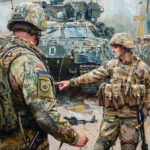
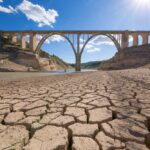



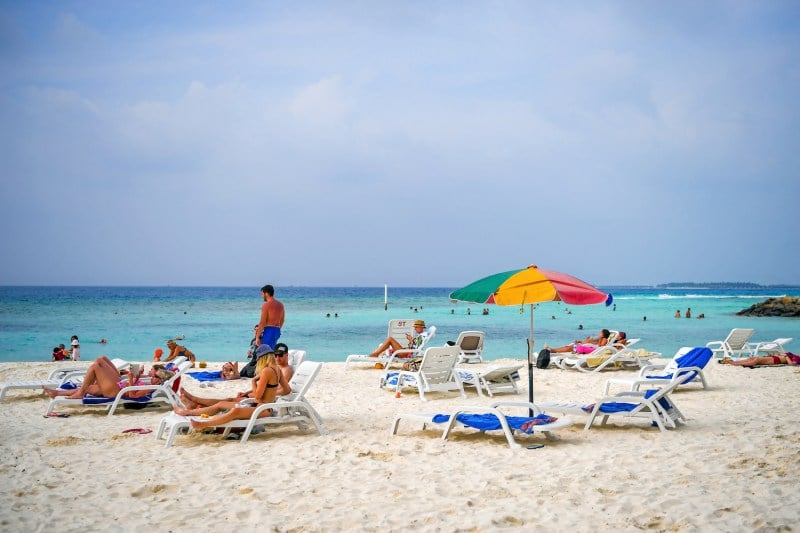
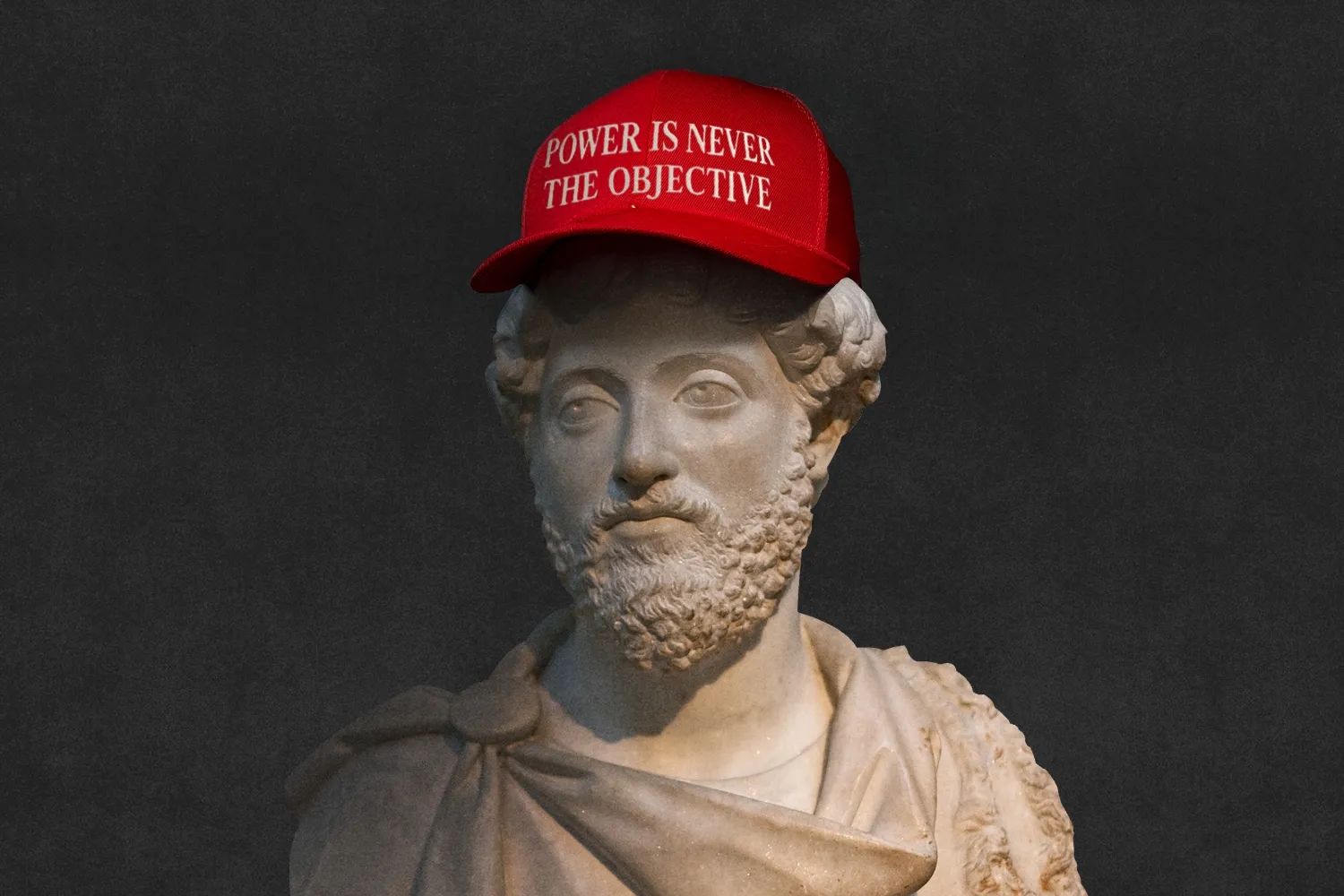
Join the Conversation
Commenting on this and other recent articles is just one benefit of a Foreign Policy subscription.
Already a subscriber?
.
Subscribe
Subscribe
View Comments
Join the Conversation
Join the conversation on this and other recent Foreign Policy articles when you subscribe now.
Subscribe
Subscribe
Not your account?
View Comments
Join the Conversation
Please follow our comment guidelines, stay on topic, and be civil, courteous, and respectful of others’ beliefs.
Change your username |
Log out
Change your username:
CANCEL
Confirm your username to get started.
The default username below has been generated using the first name and last initial on your FP subscriber account. Usernames may be updated at any time and must not contain inappropriate or offensive language.